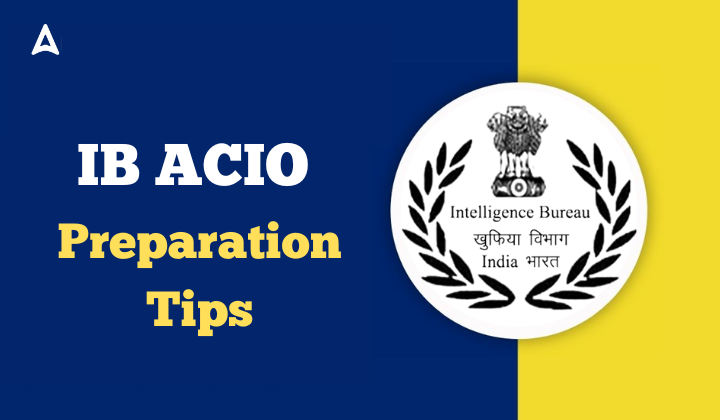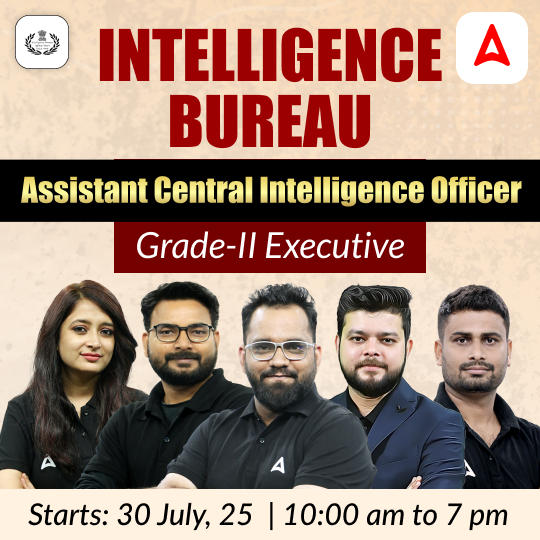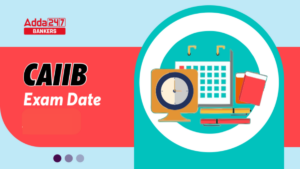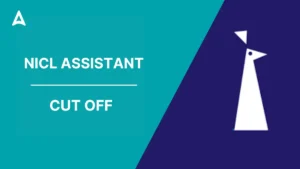The Intelligence Bureau has released the notification of Assistant Central Intelligence Officer, and this is the best time to prepare for this post. This year total of 3717 vacancies for the executive post have been announced. Interested candidates can apply for this post and start their preparation now with IB ACIO Preparation Tips 2025.
IB ACIO Preparation Tips 2025
The Intelligence Bureau conducts the IB ACIO Recruitment 2025 process in three stages: an Objective Test (Tier 1), a Descriptive Test (Tier 2), and a Personal Interview. Candidates begin their journey with Tier 1, which is an objective-type examination comprising five key subjects Current Affairs, General Studies, Numerical Aptitude, Reasoning/Logical Aptitude, and English Language.
IB ACIO Tier 1 Exam Pattern
The Tier 1 objective test assesses candidates across five distinct subjects: Current Affairs, General Studies, Numerical Aptitude, Reasoning/Logical Aptitude, and English Language. Each section typically carries 20 questions, making up a total of 100 questions for 100 marks, to be completed within 60 minutes. A crucial aspect to remember is the negative marking of 1/4th mark for each incorrect answer.
Subject-Wise Preparation Strategies for IB ACIO Tier 1 2025
To maximize your score and ensure comprehensive preparation, consider the following subject-wise tips:
Current Affairs
This section is all about staying updated with recent happenings.
- Create a Daily Hobbit: Make it a habit to engage with national and international news every single day. Focus on significant events, government policies, economic developments, scientific breakthroughs, sports achievements, and major awards.
- Diverse Sources: Don’t limit yourself to one news source. Explore various reputable newspapers, online news portals, and monthly current affairs magazines. This broadens your perspective and ensures detailed coverage.
- Strategic Note-Taking: Instead of just reading, actively create concise notes. Categorize events, dates, names, and key facts. Consider using a digital tool or a dedicated notebook for quick revision. Prioritize topics that have been prominent for the last 6-8 months.
- Regular Quizzing: Test your knowledge frequently through online quizzes and current affairs sections in mock tests. This helps identify areas where you need more focus.
General Studies
General Studies covers a vast syllabus including History, Geography, Indian Polity & Constitution, Economy & Finance, Science & Technology (Physics, Chemistry, Biology), and Static GK.
- Concept Clarity: For subjects like Indian Polity, History, and Geography, prioritize understanding fundamental concepts rather than rote memorization. Connect events and policies to their broader implications.
- NCERT Foundation: For a strong base in Science, History, and Geography, revisit NCERT textbooks from classes 6 to 12. These books present information in a clear and accessible manner.
- Strategic Categorization: Break down Static GK into manageable categories like important national symbols, famous personalities, significant dates, international organizations, and major physical features.
- Mind Maps and Flowcharts: Visualize complex information through mind maps and flowcharts. This aids in better retention and recall, especially for intricate topics.
- Previous Year Trends: Analyze previous year’s questions to understand the types of questions asked and the weightage given to different sub-topics within General Studies.
Numerical Aptitude
This section tests your mathematical ability, covering topics like Number Systems, Percentages, Ratio and Proportion, Profit & Loss, Time & Work, Time, Speed & Distance, Averages, Mensuration, Simple & Compound Interest, and Data Interpretation.
- Mastering Fundamentals: Before attempting complex problems, ensure a rock-solid understanding of basic mathematical operations, formulas, and concepts.
- Daily Practice Drills: Dedicate a specific time each day to solve a variety of quantitative aptitude problems. Focus on improving both accuracy and speed.
- Shortcut Techniques: Learn and practice mental math techniques and shortcut formulas to save time during the exam. However, ensure you understand the underlying logic before relying solely on shortcuts.
- Data Interpretation Focus: Practice different types of Data Interpretation sets (tables, bar graphs, pie charts, line graphs) to improve your ability to quickly analyze and interpret data.
- Error Analysis: After practicing, thoroughly review your incorrect answers. Identify the root cause of the error was it a conceptual mistake, a calculation error, or a time management issue.
Reasoning/Logical Aptitude
This section evaluates your logical thinking and problem-solving skills, including topics like Blood Relations, Coding-Decoding, Series, Analogy, Seating Arrangement, Puzzles, Direction Sense, and Syllogism.
- Variety of Puzzles: Engage with a wide range of logical puzzles, not just those directly from previous exams. This enhances your general problem-solving and critical thinking abilities.
- Visualize and Diagram: For questions like Blood Relations or Seating Arrangements, actively draw diagrams or create visual representations. This can simplify complex relationships.
- Pattern Recognition: Many reasoning questions revolve around identifying patterns. Practice it and develop your ability to quickly identify such patterns.
- Time-Bound Practice: Practice reasoning questions under timed conditions to simulate the exam environment and improve your speed and efficiency.
- Focus on Logic: Reasoning means applying logical principles, not memorizing solutions. Understand the logic behind different types of questions.
English Language
This section check your command over the English language including grammar, vocabulary and comprehension. It includes reading comprehension, synonyms and antonyms, fill in the blanks, error recognition, idioms and phrases, one-word substitution, sentence improvement and sentence rearrangement.
Grammar Foundation: Revise fundamental grammar rules (parts of speech, tenses, subject-verb agreement, active-passive voice, direct-indirect speech). Practice identifying and correcting grammatical errors.
Vocabulary Building: Make it a habit to learn new words every day. Use flashcards, vocabulary apps or create a dedicated vocabulary notebook. Pay attention to synonyms, antonyms and contextual usage.
Active Reading: Read newspapers, articles, and short stories regularly to improve your reading comprehension skills. Focus on understanding the main idea, identifying supporting details, and drawing conclusions.
Practice Passages: Work through a variety of reading comprehension passages. Give attention to question types (e.g., direct questions, inferential questions, tone of passage).
Mock Test Analysis: Analyze your performance in the English section of the mock test carefully. Identify specific areas (e.g., prepositions, conjunctions, specific vocabulary types) where you consistently make mistakes and practice them extra.
| Related Posts | |
| IB ACIO Previous Year Question Papers | IB ACIO Syllabus |
| IB ACIO Salary | IB ACIO Cut Off |





 CAIIB Exam Date 2026 Out for June & ...
CAIIB Exam Date 2026 Out for June & ...
 NICL Assistant Cut Off 2026, Check Previ...
NICL Assistant Cut Off 2026, Check Previ...
 RBI Issues Draft Guidelines on Forex Dea...
RBI Issues Draft Guidelines on Forex Dea...








